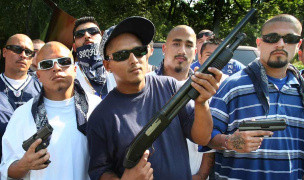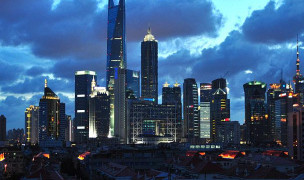 9 Terms
9 TermsHome > Terms > English (EN) > mayors
mayors
Cities are units of taxation, representation, service and identity. All these demand governance, which, since the American Revolution, has been vested in locally elected officials at City Hall. Over the centuries, patricians have given way to immigrant bosses, reformers, politicians and outsiders. In the early twenty-first century, a mayor, city council or city manager must manage conflicting factions and guide a city, while shaping regional, national and international images. Hence, mayors have included charismatic and controversial figures on the frontline of politics—LaGuardia and Giuliani in New York City, NY, Alioto and Feinstein in San Francisco, CA, the Daleys in Chicago, IL, etc.
Only two American mayors, however (Grover Cleveland and Calvin Coolidge), have become president.
City governments vary widely in their constitution and powers, set by states (or the federal government for Washington, DC). Urban administration generally must appoint officers, set agendas and budgets (on the basis of local revenues and, in the postwar era, increasing federal inter-vention) and manage services including parks, security education and ceremonial visits. Strong mayors control—or delegate to department heads and managers—most functions of government; others, however, share functions with their elected city councils, which may represent neighborhoods or interest groups. Depending on the city charter (itself often dependent on the state), police chiefs, Boards of Education, and somewhat autonomous institutions dealing with water, housing, transportation and health may further divide responsibility. Moreover, the complexities of urban laws and records mean that even small cities have bureaucracies that endure long after any mayor leaves office. Finally, city government must balance interests of state and federal government, competing regional interests and divided citizens. This becomes critical as development and welfare programs have become areas of shared responsibility or in emergent policy questions—environment or immigration—in which the city cannot control policies, although it must deal with consequences. The need for coordination also underscores the impact of suburbs on city administrations: cities are swamped by, yet cut off from, metropolitan growth. The era of annexation ended well before the Second World War, although few real consolidated planning and governance structures have emerged in expanding metropolitan areas. Suburbanites, in turn, may be more likely to identify a charismatic urban leader than the bureaucrats generally charged with the planning and politics of sprawl. Hence, mayors negotiate constantly—with other governments, unions, businesses and citizens.
Traditional mayors tend to be found in large American cities, older cities and the Northeast. Such mayors are intensely political, often within a highly partisan framework (although socialists dominated Milwaukee and reform candidates have beaten the system elsewhere). For most of the twentieth century mayors were identified with political machines that organized, coerced and bought votes—with money or patronage—in order to promote party interests; Chicago’s Richard Daley was such a kingpin. Local organization, from ward politics and political clubs through urban patronage, can play a strong role in state and national elections as well. The urban dead, according to folklore, have voted many times in Chicago and Philadelphia, PA. Civil-service reforms and other watchdogs have been used to control such party bosses.
Yet the immediacy and intensity of city government has made it an area of breakthroughs for those outside the system, including minorities and women. In the turnof-the-nineteenth-century South, for example, Jewish mayors were elected as reformers from Savannah, GA to New Orleans, LA. Irish and Italian ethnics also made mayoralties stepping stones to urban recognition. Later, in the 1970s, African American mayors spoke to changing majorities optimistically or defensively; Hispanic mayors in San Antonio, TX and Miami, FL also have marked changes in urban demographics.
Women have most readily gained urban power in small cities, but San Francisco, Chicago and Washington, DC all have elected women mayors.
Yet one must not over-emphasize macro-politics. In fact, most American cities have only figurehead mayors, eschewing personality and corruption for a professional city manager. This format, in which city councilors contract an administrator, was first adopted in Dayton, Ohio in 1913. It remains most common in the West and in cities of under 100,000, although these have become Sunbelt metropoles. City managers are apolitical, without the community roots mayors rely on; nor can they set policy independently.
Strong or weak, the mayor often shapes the image of the city in significant ways. In the 1960s, liberal Republican John Lindsay was stylish for New York, while Ed Koch proved down to earth and David Dinkins, as an African American, recognized the new minority mosaic in the city Mayor Rudolph Giuliani focused on creating a “civil” city, sometimes crossing the line between quality of life and denying those who mar the clean city. By contrast, Mayor Marion Barry’s arrest for crack possession seemed to epitomize the decay of Washington. Symbolism and power converge in the effectiveness of decisions, actions and planning.
Mass media are also critical. City government gains constant attention—political, economic and personal—in local newspapers and television. Mayors become spokespersons and lightning rods in crises: Tom Bradley addressed both fellow citizens and national media to calm a rioting Los Angeles, CA. Fictional media seem rather unsympathetic: movies and literature have concentrated on corruption and bossism from the 1930s onwards. Later cinematic mayors face crime or disaster until the “real” hero arrives—a Batman scenario. In television’s Spin City (ABC, 1996–), in fact, a bumbling New York City mayor is completely managed by the administrators around him.
- Part of Speech: noun
- Synonym(s):
- Blossary:
- Industry/Domain: Culture
- Category: American culture
- Company: Routledge
- Product:
- Acronym-Abbreviation:
Other Languages:
Member comments
Terms in the News
Billy Morgan
Sports; Snowboarding
The British snowboarder Billy Morgan has landed the sport’s first ever 1800 quadruple cork. The rider, who represented Great Britain in the 2014 Winter Olympics in Sochi, was in Livigno, Italy, when he achieved the man-oeuvre. It involves flipping four times, while body also spins with five complete rotations on a sideways or downward-facing axis. The trick ...
Marzieh Afkham
Broadcasting & receiving; News
Marzieh Afkham, who is the country’s first foreign ministry spokeswoman, will head a mission in east Asia, the state news agency reported. It is not clear to which country she will be posted as her appointment has yet to be announced officially. Afkham will only be the second female ambassador Iran has had. Under the last shah’s rule, Mehrangiz Dolatshahi, a ...
Weekly Packet
Language; Online services; Slang; Internet
Weekly Packet or "Paquete Semanal" as it is known in Cuba is a term used by Cubans to describe the information that is gathered from the internet outside of Cuba and saved onto hard drives to be transported into Cuba itself. Weekly Packets are then sold to Cuban's without internet access, allowing them to obtain information just days - and sometimes hours - after it ...
Asian Infrastructure Investment Bank (AIIB)
Banking; Investment banking
The Asian Infrastructure Investment Bank (AIIB) is an international financial institution established to address the need in Asia for infrastructure development. According to the Asian Development Bank, Asia needs $800 billion each year for roads, ports, power plants or other infrastructure projects before 2020. Originally proposed by China in 2013, a signing ...
Spartan
Online services; Internet
Spartan is the codename given to the new Microsoft Windows 10 browser that will replace Microsoft Windows Internet Explorer. The new browser will be built from the ground up and disregard any code from the IE platform. It has a new rendering engine that is built to be compatible with how the web is written today. The name Spartan is named after the ...
Featured Terms
CPU
CPU is short for Central Processing Unit, it is the core of a computer; Necessary for computing performance. It is used in a lot of 3c products.
Contributor
Featured blossaries
Browers Terms By Category
- Inorganic pigments(45)
- Inorganic salts(2)
- Phosphates(1)
- Oxides(1)
- Inorganic acids(1)
Inorganic chemicals(50) Terms
- General boating(783)
- Sailboat(137)
- Yacht(26)
Boat(946) Terms
- American culture(1308)
- Popular culture(211)
- General culture(150)
- People(80)
Culture(1749) Terms
- Fuel cell(402)
- Capacitors(290)
- Motors(278)
- Generators(192)
- Circuit breakers(147)
- Power supplies(77)
Electrical equipment(1403) Terms
- Yachting(31)
- Ship parts(4)
- Boat rentals(2)
- General sailing(1)





